Do you need supplements when adopting a raw, natural human diet? Most likely, yes! We all are aware of the sad fact that our modern toxic world does not provide us with what it once did. But, what is less known is that we need to consider the dietary and nutritional shortcomings when living outside the tropics – because we are a tropical, frugivorous species living outside their natural habitat! The most natural approach (which humans have been doing forever) is to imitate our original environment, even better. In this article, we explore the supplements needed to do so.
Why a raw, fruit-based diet?
Everything animals eat in the wild is raw. A raw diet is not extreme – it is a natural concept. Cooking was (and still is) a survival strategy of humans when living in areas without abundant food that we would eat in our natural habitat – tropical fruits. Further, we do not have physiological adaptations that hook us to a cooked diet! Our species’ natural diet is still raw!
However, we need to know how to do raw right – with our biologically appropriate diet and foods. And to know what foods are really foods for humans, we need to shine a light on the most neglected topic in nutrition and the pink elephant in the room of diets: Humans are frugivores!
Did you know that we are frugivores?
On the quest to find the natural human diet, we now re-discover that humans are biologically specialized in eating ripe fruits:
We are biologically specialized in fruit-eating!
The human anatomy and physiology are essentially that of a primate frugivore. This means – very similar to chimpanzees – we are specialized fruit-eater that originated in the tropics! Frugivores are a subtype of omnivores that preferably and mainly eat ripe fruits.
We live and eat outside our natural habitat!
As a species, humans originated in the tropics, but most of us live outside our natural habitat nowadays, and we don’t live within nature. As a result, most of us do not have easy access to the food sources we have evolved with, which is why we have turned to sub-optimal, cooked foods – our fallback foods.
Read more about frugivores here.
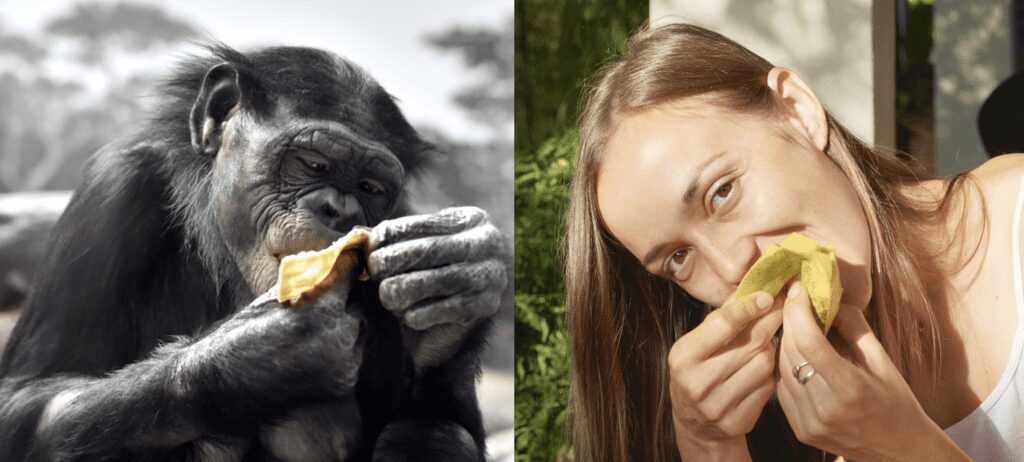
Why do we need supplements on a raw, natural diet?
The lack of awareness of our nature as tropical frugivores – and consequently the need for nutrition provided by tropical fruits, foods and environment – is a key cause of why raw diets fail! Unfortunately, supplements are often not welcomed in the raw community because, in nature, no animal needs supplements.
While it is obvious that nature should provide everything we need as biological beings, humans are unique in this regard: We live outside our original biological habitat – the tropics – which is why we need to consider supplements! If you adopt a raw diet, please check your nutrients regularly!
Another problem that concerns nearly everyone living on earth is nutrient-depleted soils and modern agriculture. If you do not produce your own foods on healthy soil or – even better – can access wild foods, chances are you do not get the nutrients that our ancestors got.
Places outside the tropics cannot provide us with the nutrition we need, naturally!
We need to balance the shortcomings of the “wrong” environment, especially when living outside the tropics and restricted access to tropical fruits. Additionally, civilization has degraded natural habitats and resources needed for a healthy diet worldwide!
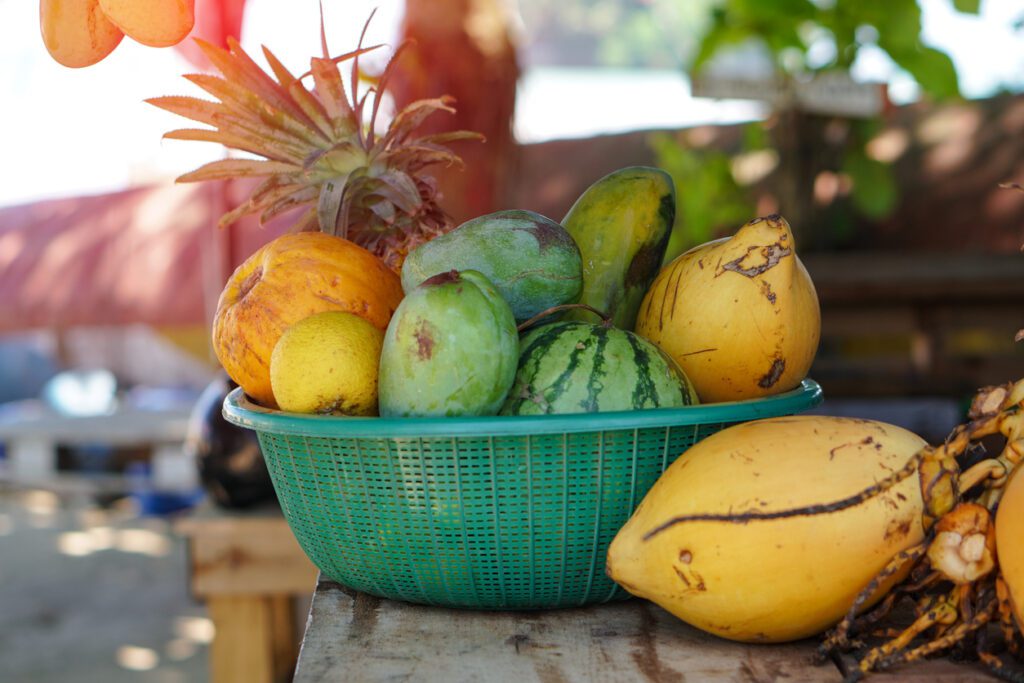
Humans are a tropical species! Unfortunately, most humans do not live in a tropical climate with abundant wild tropical fruits and foods – our species’ natural habitat. This is why we have survival foods, cooked foods, since the Paleolithic era, due to migrating out of tropical climates. Read more here.

For best health, it is imperative to imitate our ecological niche because we have evolved in those conditions. Changing our original habitat leads to shortfalls, deficiencies, and, ultimately, health consequences!
Humans imitate the tropics, wherever we are, and the better we do that, the better we feel and thrive!
One example of what happens if we live in the wrong biome, outside our natural habitat, is Alpine cretinism: People living in the Alps before iodine supplementation suffered severe iodine deficiency. It caused not only goiters but also decreased mental health and short stature. Those Alpine populations lived far away from the ocean and missed iodine sources in their foods.

Do you need nutritional supplements?
Most likely, yes, if you live outside the tropics and/or have a lot of detox and elimination cleansing to do! Because those processes require more nutrients and minerals than our body usually on a species-specific diet requires. Also, absorption needs to be optimal, in order to get enough. While this is true for a raw diet, it is true for any other diet, too!
Most likely, yes, if you eat produce grown on nutrient-depleted soil, instead of tropical fruits and foods that are grown in healthy soil.
Maybe no, if you live in the tropics within nature and have access to fresh, ripe fruits and foods. Additionally, if you have not been pre-damaged by eating a wrong diet for all your life – like most of us!
Nutritional supplementing is not new! Our ancestors “supplemented” their diet in colder areas with “functional foods”! For example, fish oil or dairy contains Vitamin D3.
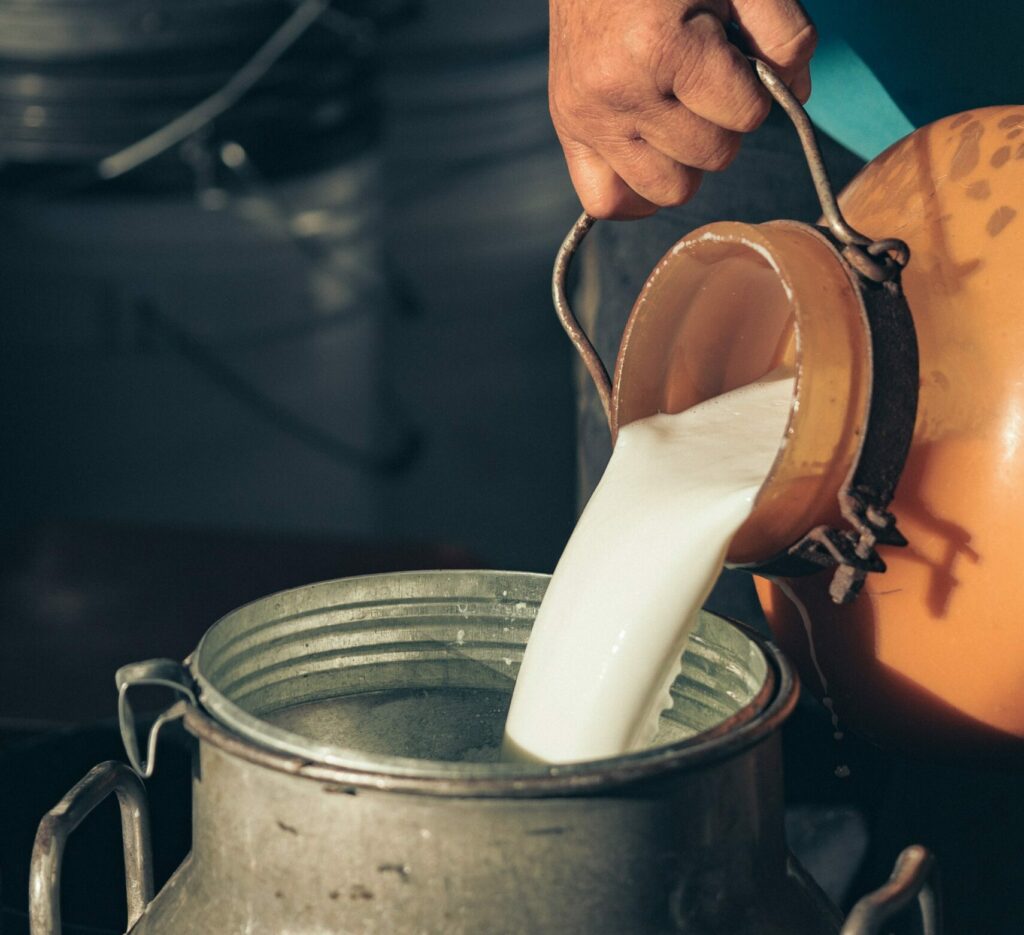
Nutritional Supplements on a raw diet
There are supplements and supplements! Choose additive-free and organic whenever possible. Luckily, functional foods, instead of lab-created, isolated compounds, can address many nutritional shortcomings. So, which nutrients should be considered on a raw diet?
“Environmental” supplements
Environmental supplements compensate for environmental shortcomings (see above) and provide the nutrients that are not available:
- Vitamin D3 Supplement or specialized light devices
- Vitamin B12 Methylcobalamin
- Iodine Kelp, Sea moss, Dulce
- Selenium Brazil Nuts
- Zinc i.e. from guava leave extract
- Grass juice powder for minerals
- Extracts and teas from leaves of guava, mango, and papaya for minerals and phytochemicals
- Magnesium and calcium Coral powder, Magnesium Malate, Green powders, Dead Sea Salt baths
Additional supplements to consider
During transitioning, increased detox or to boost a raw diet, there are additional helpful supplements:
- Powdered exotic fruits like camu camu and other wild exotic fruits for more micronutrients
- Maca Root for micronutrients and hormonal support
- Curry leave extract to supply iron and other micronutrients, comes with many health benefits
- Chlorella cultivated in glass tubes for heavy metal detox
- Organic sulfur (MSM) for sulfur, detoxification enzymes, and anti-parasite effect
- Anti-parasitic herbs and agents like Artemisia
- Iron from curry leave extract, only if you are depleted
1. Vitamin D3
Vitamin D3 in colder climates: In temperate climates, you will not be able to synthesize Vitamin D during October and April. The sun needs to reach an angle more than 45 degrees above the horizon for effective vitamin D synthesis in your skin. The lighter the skin, the more effective sun energy can be used, as light skin is an adaptation to poor sun availability and Vitamin D deficiency stress in colder climates! Read more here about the adaptations of cold-indigenous people to living in cold climates.

If you cannot get enough sun exposure, you should consider supplementing “the sun”. From June to August, you should lie in the sun for at least 30 minutes with a large portion of your skin surface uncovered. Adopting a raw natural diet makes the skin more resistant to sunburns. And be aware of sunglasses: letting natural sunlight into your eyes signals the body that the skin needs to prepare for the sun’s impact! Thus not wearing sunglasses helps to prevent sunburn.
Getting Vitamin D3 through supplements is the ususal way. However, it is certainly not optimal. There are Vitamin D light devices that imitate the natural conditions we need more holistically. See this study published in nature on Vitamin D-stimulating LED light.
2. Vitamin B12
Vitamin B12 is exclusively produced by certain types of bacteria, which are found in the soil, but also in the human microbiome, Pseudomonas p. and Klebsiella sp. (Albert et al., 1980; Guetterman et al., 2022). Thus, in a perfect world – or let’s say in a perfect gut – B12 is produced by some of our friendly mutualistic bacteria. Unfortunately, human microbiomes are severely disrupted by antibiotics, pesticides, and pollutants we find in our modern and toxic world.
This is why supplementation is helpful until the microbiome is healthy enough to produce the cobalt-containing vitamin by itself.
There is another critical view on this though: vitamin B12 is synthesized in the intestines, however it is excreted without being absorbed! This problem seems to be resolved by animals eating their own feces (or other species’ feces), because the vitamin is present in excrements:
“It has long been assumed that B12 is produced by bacteria in the large intestine (aka the colon), but since B12 is produced below the ileum (where B12 is absorbed), it is not available for absorption. This theory is reinforced by the fact that many species of totally or primarily vegetarian animals eat their feces. Eating feces allows them to obtain B12 on their diets of plant foods.”
veganhealth.org
However, it has also been shown that a natural environment (which includes a frugivorous diet) can promote a healthy microbiome up to the point that the B12-producing bacteria are able to colonize the intestines higher up – where B12 is absorbed – and thus prevent deficiency on a plant-based diet (read the full article on this topic here).
Are bananas a recently discovered source of B12? Lately, bananas are being mentioned as a plant-based source of vitamin B12 – which is very surprising, given that B12 is found in animal-based foods and is produced by microorganisms! Do bananas really contain vitamin B12? Recent studies describe banana pulp and peel as a source of vitamin B12. See here, here, and here. A vitamin B12-containing fruit is something that would contribute to a shift in dogma concerning B12 and plant-based nutrition. I can’t fully grasp the idea of a B12-containing fruit yet – it’s too good to be true! Read more about bananas.
Traditionally, bananas were used to combat anemia, which could be due to two key nutrients for blood building: iron and vitamin B12. The iron content is sometimes described as low and sometimes as high. Such contradicting information is not surprising considering the differences in the quality of the fruits. I assume that the vitamin B12 content of bananas is variable, too, and I would not consider them a reliable source, especially if you cannot get high-quality produce. Further, there is a lack of information on the type of B12 found in bananas, whether it’s a bioactive form of cobalamin or pseudocobalamin.
This topic is highly relevant for plant-based diets, and more research on whether bananas can be a B12 source for humans would further aid in understanding the human diet and the role of tropical fruits in it!
What does this all mean for vitamin B12 supplementation? The closer we stick to our natural diet and live in an untouched natural environment, the less likely we need to supplement. Unfortunately, this is hardly the case for anyone alive today!
Can you benefit from supplementing vitamin B12? My educated guess is, that you benefit if
- your microbiome is unbalanced and pre-damaged
- you had antibiotics in your lifetime
- you are exposed to chemical pollution (agriculture or urban life)
- If your foods do not contain enough cobalt
In order to produce B12, we need a healthy colonization by B12-producing bacteria plus the mineral cobalt, which we get from nuts and greens. The same is true for animals – and thus “livestock”:
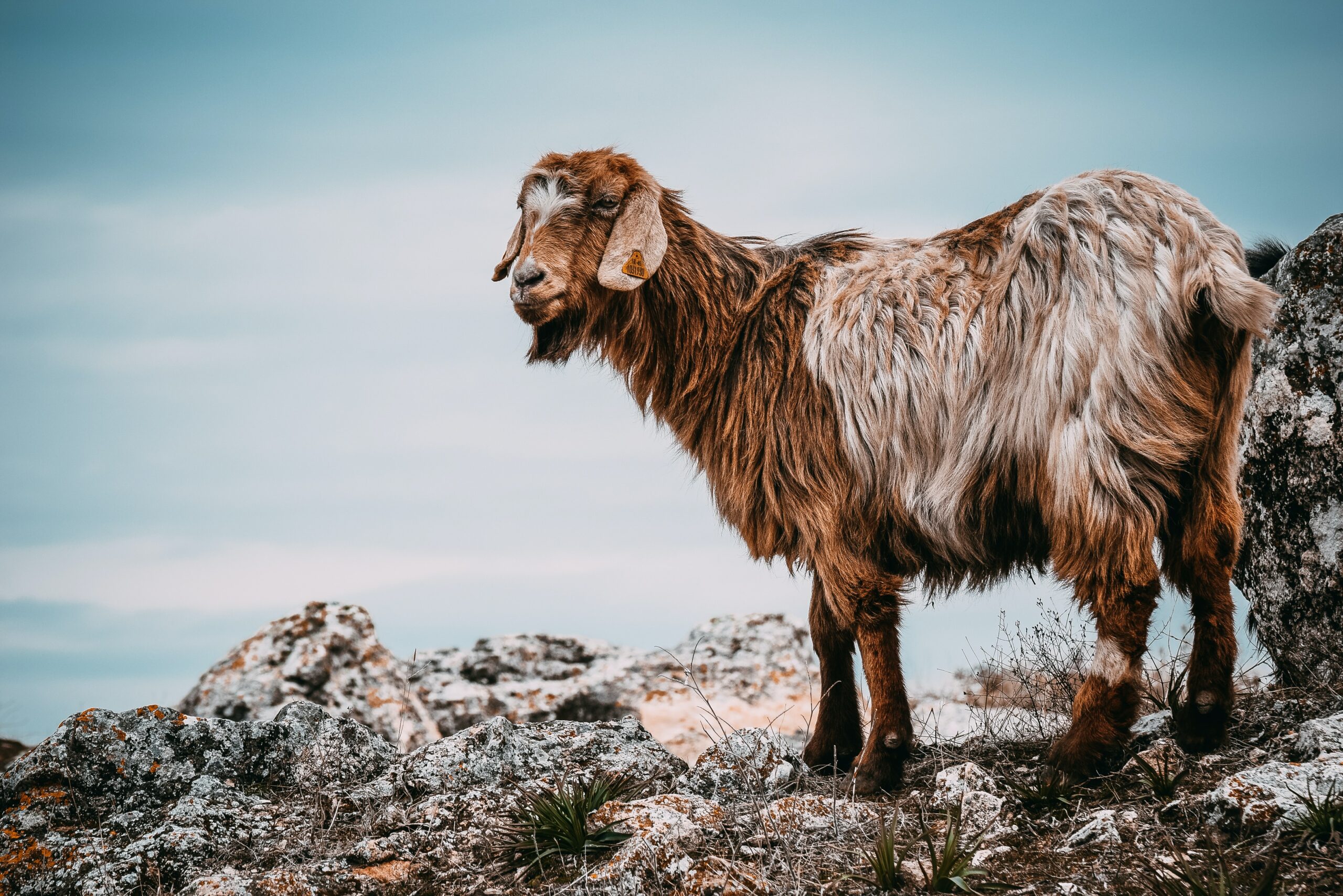
It is a misconception that humans need animal foods to obtain B12!
The cobalt-containing vitamin is not per se synthesized by animals but by their microbiome – just like our own! “Livestock”, ruminants, need to be supplemented with cobalt (or B12 directly) if there is insufficient cobalt in the food.
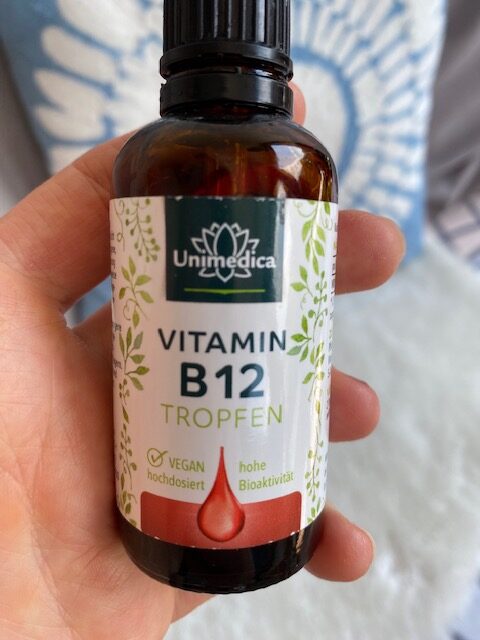
Image: Example of a high-quality vitamin B12 liquid supplement.
The quality of vitamin B12 is an important factor. As of today, methylcobalamin is being favored over the commercially most easily available cyanocobalamin: methylcobalamin is the natural and active form found in foods (read more here on different types of B12). It also has shown to have more positive outcomes for the microbiome (Xu et al.; 2018).
3. Iodine
In nature, iodine is primarily present in the sea and the environment near the sea – for example, edible greens from the sea are a rich source of iodine. Getting this element is not so much a question of the type of food you are eating but where it has been growing. For example, we can get iodine just by breathing in marine air. On the other hand, milk (which is often promoted as an iodine source) from the iodine-poor Alpes mountains originally was not a good iodine source for the locals. In short, this nutrient needs to be supplemented when living in an iodine-poor environment. Whole populations of countries (i.e., Switzerland) living in iodine-poor areas are supplemented via added iodine table salt – which shows that getting iodine depends more on the environment than on the types of foods.
This means, the further away you live from the sea, the less iodine is present in the environment, particularly the air and food. Therefore, if you do not live near the sea, consider supplementing iodine! Fortunately, there are functional foods to do so!
Functional foods with iodine are kelp, sea moss, and dulce. Besides iodine, sea moss contains many other minerals and is an important add to raw vegan diet!
Unfortunately, the iodine shortage in food and the environment is widespread. Not to a degree of developing a goiter, but not enough for optimal function. This issue has intensified due to the increased use of natural non-iodized salts, like pink Himalayan salt or sea salt. There are better ways to go than iodized table salt, though: high-quality seaweed is a natural iodine source, where the iodine is organically bound. Make sure the iodine content on your kelp (or other seaweeds) is labeled on the product.
If you consider taking an iodine supplement, be sure it does not exceed the RDA.
4. Selenium
Selenium is an important mineral, a synergist of iodine and important in detoxification processes. If you live in selenium-poor areas (Europe!) you can comfortably supplement selenium naturally by consuming 1-2 Brazil nuts a day! A few nuts typically contain enough selenium to meet your daily requirement. However, selenium content in Brazil nuts vary, depending on the selenium content of the soil. Therefore try to access Brazil nuts with their selenium content labeled on the package.
5. Zinc
Zinc is a widespread deficiency in the modern world for several reasons. One main problem is copper overload from copper-based pesticides, which are even used in organic farming. Copper depletes zinc. But other factors in our unhealthy, toxic world deplete zinc, too, like increased toxic burden, or stress. To aggregate the zinc shortcoming, there is little zinc in raw foods produced in our modern food system. Wild foods contain much more minerals, as our soils are depleted in many micronutrients, including zinc. Zinc-rich foods are often animal-based foods, grains, or legumes – foods that should not be eaten raw.
6. Greens and fruit leaf extracts
Moringa leaf powder or grass juice powder are green functional foods that get mineral nutrition that is decreased in today’s cultivated foods and fruits due to soil depletion. It is important to get grass juice powder, not powdered grass, as we cannot digest greens as efficiently to extract the nutrition. And in organic quality. Make sure to increase the amount to a few spoons daily! The less tropical, ripe, high-quality fruits you can get your hands on, the more important to supplement extra minerals in a natural, bio-available way!
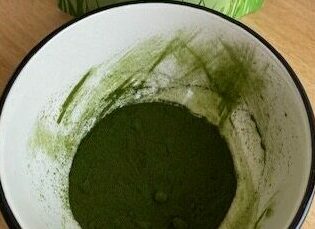
Leaves of tropical fruit trees can be a way to imitate our natural diet. In addition to fruits, apes eat a significant amount of tropical leaves, where they obtain minerals. This recent study describes the manifold and astonishing nutritional profile and health-promoting properties of guava leaves:
“Plant leaves… are a rich source of high-value nutra-pharmaceutical compounds… Guava leaves are a rich source of various health-promoting micro- and macronutrients as well as bioactive compounds.”
Kumar et al., 2021
“Many fruits and unconventional foods are available in the tropics and represent valuable minerals sources. Green leaves appear as outstanding mineral sources, especially in calcium and iron, followed by nuts.”
Leterme et al., 2006
While many of us do not have access to fresh greens, we often can access teas of mango, papaya, or guava leaves and prepare our own teas as nutrient sources. What makes fruit tree leaves outstandingly suitable and healthy is that they are a natural part of our diet, while many other herbal extracts and teas are not. Read our in-depth article on greens in the human diet here.
7. Magnesium and calcium
Magnesium is found less in food plants today than it used to. While we consume less with food, the body’s requirements rise in our modern polluted environment, which requires increased detoxification activity! Calcium is a pH buffering mineral, which has been frequently reported to be in short supply during transition, because the body uses more than it naturally would.
Coral supplements are a natural way to get magnesium and calcium synergistically. Other bioavailable magnesium forms are magnesium malate or glycinate supplements (magnesium oxide is poorly absorbed). Magnesium can also be absorbed through the skin: magnesium chloride baths, baths with Dead Sea salt, or applying magnesium oil can help alongside oral supplementation.
The grass juice powder (see above) does contain magnesium in the natural green chlorophyll pigments, too. This is the most natural way to supplement it and will prevent the gastro-intestinal effects that magnesium supplements can have.
8. Organic sulfur (MSM)
Methysulfonlmethane, or short MSM, is organic sulfur, that naturally occurs in foods. In a sub-optimal raw diet sulfur can be short in supply. Despite its exotic name, MSM is one of the safest compounds to supplement!
MSM has many benefits:
- MSM supplements the essential nutrient sulfur (mineral), as a sulfur donor
- Sulfur is part of important co-factors for enzymatic activity
- MSM aids the building of the sulfur-containing amino acids methionine and cysteine
- Sulfur supports phase II detoxification in the liver, which is easily overburdened (see here)
- MSM has effective anti-parasitic effects
- MSM boosts collagen, hair, and nail production
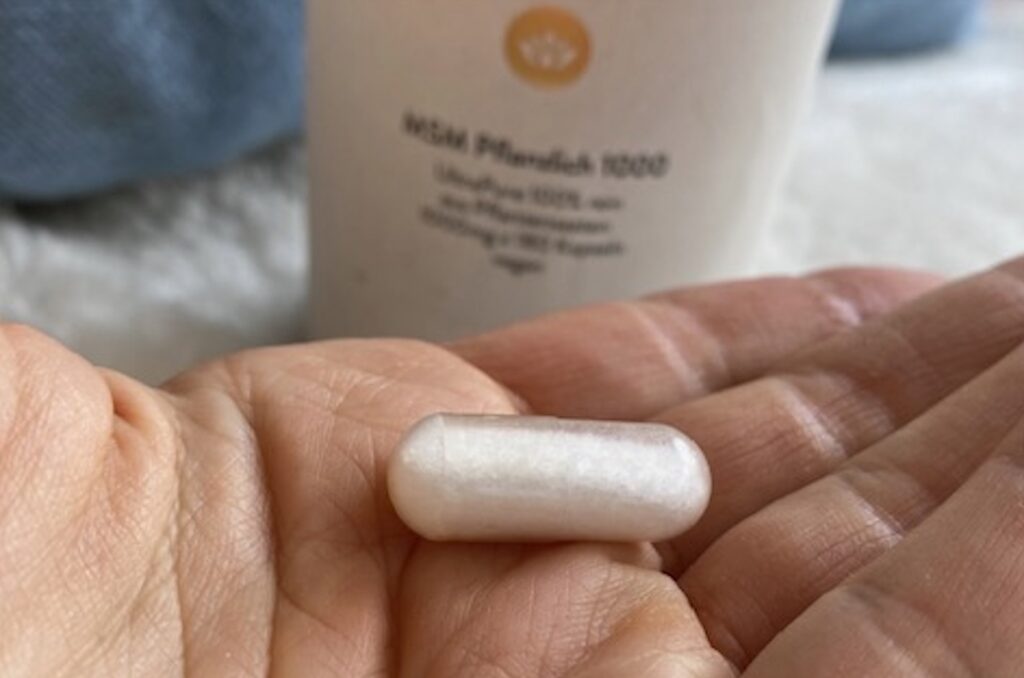
9. Iron
Iron is not needed for everyone because we can easily get enough on a raw diet. Read here, why a high-fruit will do the trick to absorb enough plant-based iron… However, sometimes we need to load iron stores if we come into a plant-based, raw diet from a vegetarian background and as women. Please check your ferritin levels to know if your iron storage is low. Do not take iron, if you do not know your iron status, because it can accumulate in the body, which is harmful.
Luckily, there are fantastic herbal products (i.e., curry leave extract), paired with vitamin C out there that can make supplementation more natural. Read our iron protocol here.
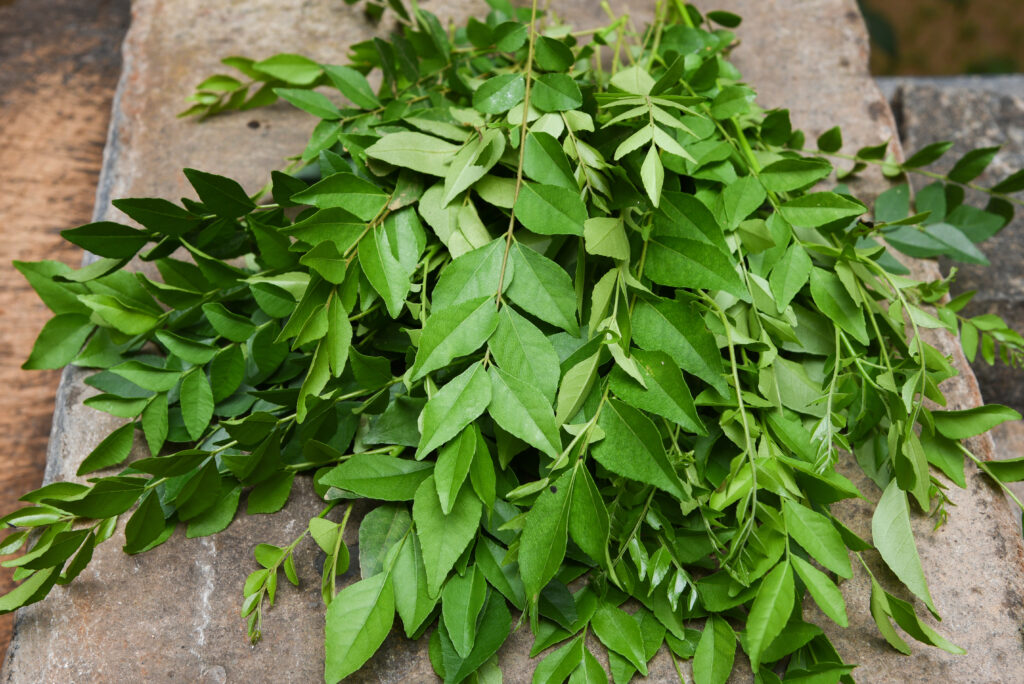
On a personal note: This topic is not the smoothest ride because of strong opinions and the complexity of the topic. However, I am committed to not shying away from hot topics and sticking to observations and nature! This article is intended to provide people in transition into a raw diet a biological perspective.
Read more here about how to adopt a high-fruit diet and here about the frugivorous human anatomy and physiology.
Read more about supplements to increase your cold tolerance here.
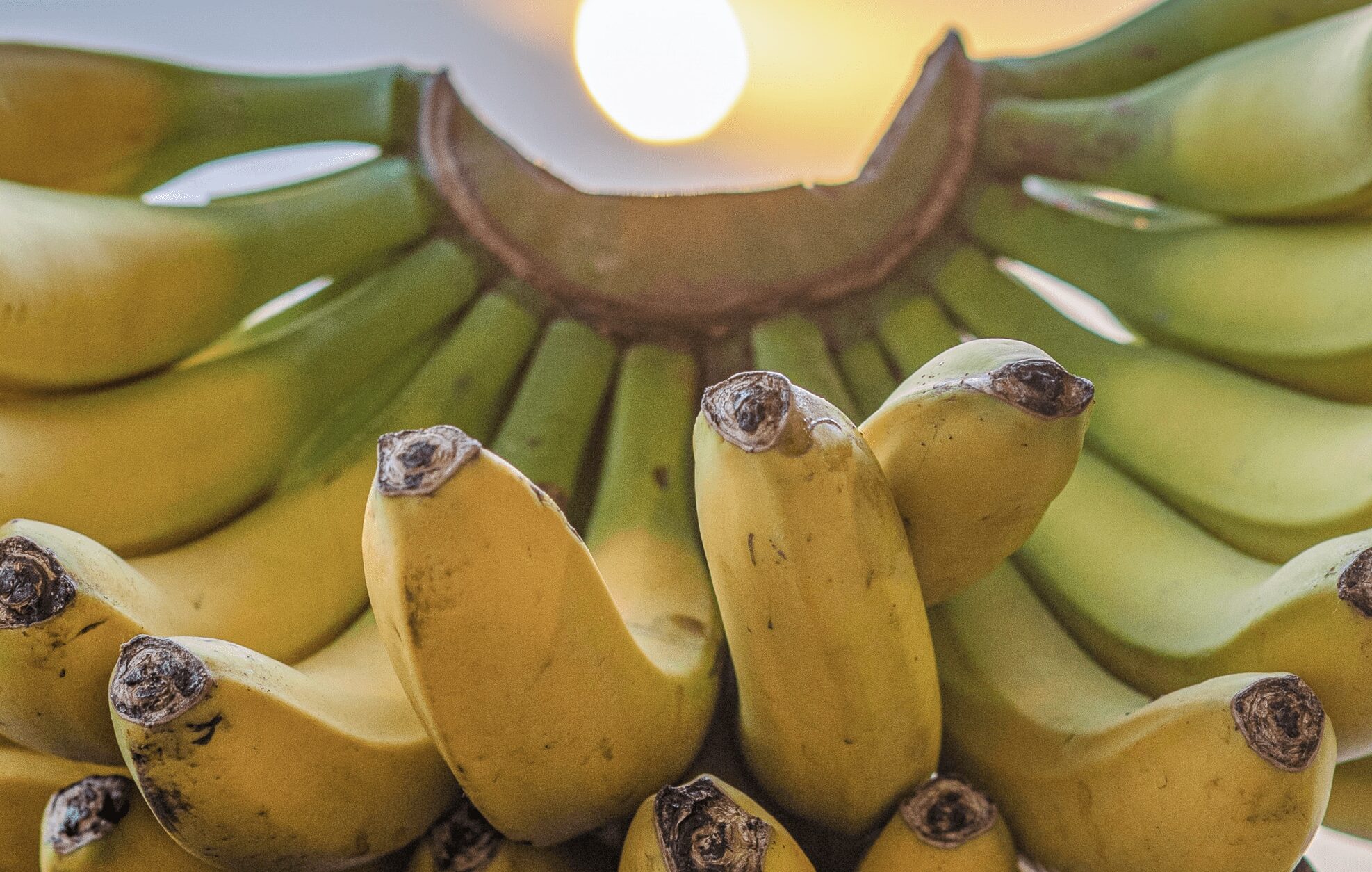
Go to How to do the Frugivore Diet
References
- Congenital iodine deficiency syndrome (2023) Wikipedia. Available at: https://en.wikipedia.org/wiki/Congenital_iodine_deficiency_syndrome (Accessed: April 5, 2023).
- Kalajian, T.A. et al. (2017) “Ultraviolet B light emitting diodes (leds) are more efficient and effective in producing vitamin D3 in human skin compared to natural sunlight,” Scientific Reports, 7(1). Available at: https://doi.org/10.1038/s41598-017-11362-2.
- Fang, H., Kang, J. and Zhang, D. (2017) “Microbial production of Vitamin B12: A review and future perspectives,” Microbial Cell Factories, 16(1). Available at: https://doi.org/10.1186/s12934-017-0631-y.
- Albert, M.J., Mathan, V.I. and Baker, S.J. (1980) “Vitamin B12 synthesis by human small intestinal bacteria,” Nature, 283(5749), pp. 781–782. Available at: https://doi.org/10.1038/283781a0.
- Guetterman, H.M. et al. (2022) “Vitamin B-12 and the gastrointestinal microbiome: A systematic review,” Advances in Nutrition, 13(2), pp. 530–558. Available at: https://doi.org/10.1093/advances/nmab123.
- Intestinal bacteria as a vitamin B12 source (no date) VeganHealth.org. Available at: https://veganhealth.org/vitamin-b12/intestinal-bacteria-as-b12-source/ (Accessed: April 5, 2023).
- Amini Khoozani A, Birch J, Bekhit AEA. Production, application and health effects of banana pulp and peel flour in the food industry. J Food Sci Technol. 2019 Feb;56(2):548-559. doi: 10.1007/s13197-018-03562-z. Epub 2019 Feb 8. PMID: 30906012; PMCID: PMC6400781.
- Isnaeni, I., Zufara, B.S. and Lewa, I.W. (2020) ‘Alternative optical methods for qualitative detection of vitamin B6 and B12 of Banana’, Jurnal Teknologi dan Industri Pangan, 31(2), pp. 147–154. doi:10.6066/jtip.2020.31.2.147.
- Grossman A. Nutrient Acquisition: The Generation of Bioactive Vitamin B12 by Microalgae. Curr Biol. 2016 Apr 25;26(8):R319-21. doi: 10.1016/j.cub.2016.02.047. PMID: 27115686.
- Oyeyinka, B.O.; Afolayan, A.J. Suitability of Banana and Plantain Fruits in Modulating Neurodegenerative Diseases: Implicating the In Vitro and In Vivo Evidence from Neuroactive Narratives of Constituent Biomolecules. Foods 2022, 11, 2263. https://doi.org/10.3390/foods11152263
- Xu, Y. et al. (2018) “Cobalamin (vitamin B12) induced a shift in microbial composition and metabolic activity in an in vitro colon simulation,” Frontiers in Microbiology, 9. Available at: https://doi.org/10.3389/fmicb.2018.02780.
- Zimmermann, J. (2022) Formen von Cobalamin (vitamin B12) IM überblick: Kanyo®, Vital und Gesund. Available at: https://www.vital-und-gesund.de/b12/cobalamin/ (Accessed: April 5, 2023).
- Xu, Y. et al. (2018) “Cobalamin (vitamin B12) induced a shift in microbial composition and metabolic activity in an in vitro colon simulation,” Frontiers in Microbiology, 9. Available at: https://doi.org/10.3389/fmicb.2018.02780.
- Hou, X., Yan, X. and Chai, C., Chemical Species of Iodine in Some Seaweeds II. Iodine-Bound Biological Macromolecules, Journal of Radioanalytical and Nuclear Chemistry, 245(3), pp. 461–467 (2000). Available at: https://doi.org/10.1023/a:1006728420096.
- D. Bennett, Educational Resources. Available at: http://health101.org/edu/ (Accessed: April 5, 2023)
- Kumar, M. et al. (2021) ‘Guava (psidium guajava L.) leaves: Nutritional composition, phytochemical profile, and health-promoting bioactivities’, Foods, 10(4), p. 752. doi:10.3390/foods10040752.
- Leterme, P. et al. (2006) “Mineral content of tropical fruits and unconventional foods of the Andes and the Rain Forest of Colombia,” Food Chemistry, 95(4), pp. 644–652. Available at: https://doi.org/10.1016/j.foodchem.2005.02.003.
- US4914135A – use of methylsulfonylmethane to treat parasitic infections. Google Patents (available at https://patents.google.com/patent/US4914135A/en).
- N. Muizzuddin, Beneficial effects of a sulfur-containing supplement on hair and nail condition (2022) Natural Medicine Journal. Available at: https://www.naturalmedicinejournal.com/journal/beneficial-effects-sulfur-containing-supplement-hair-and-nail-condition (Accessed: April 5, 2023).


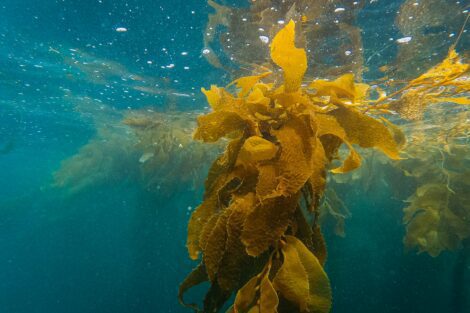
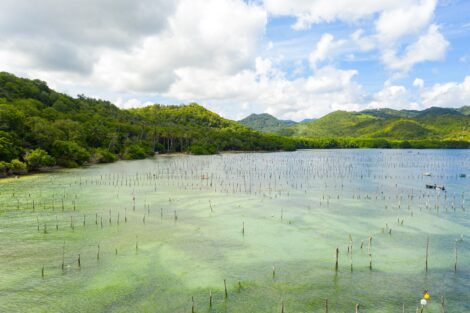
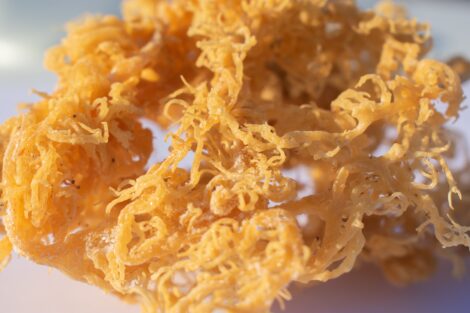
Add Comment